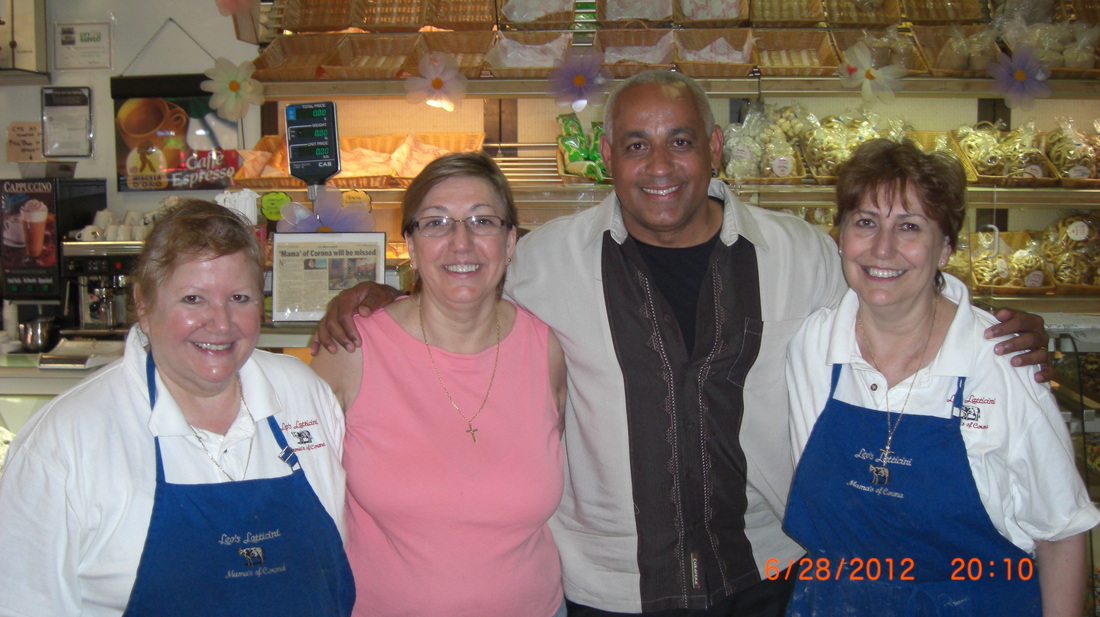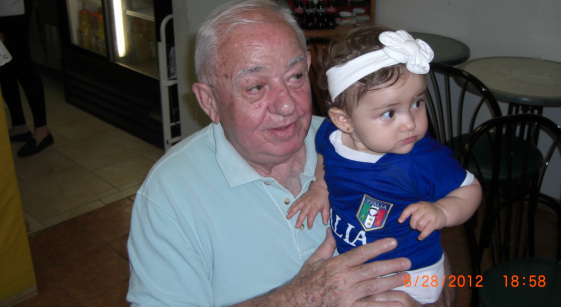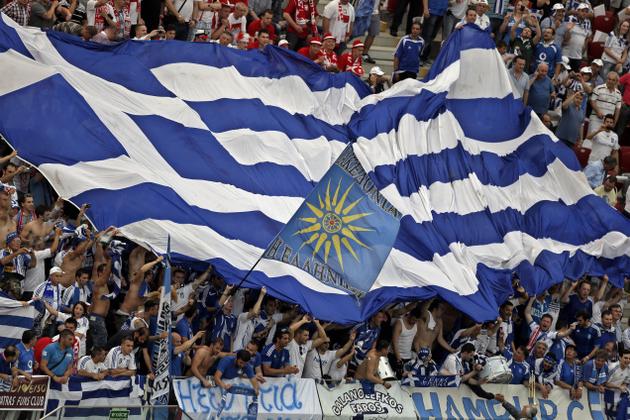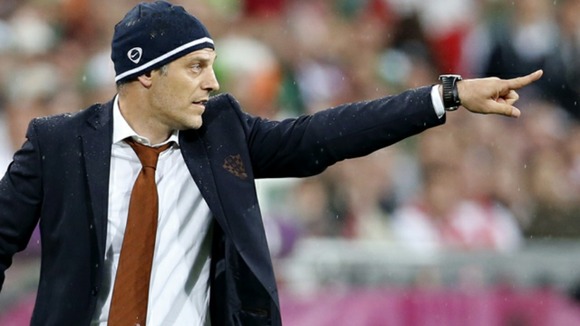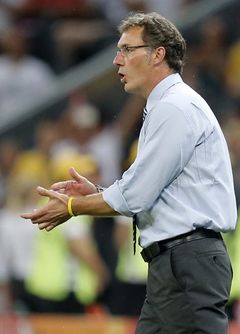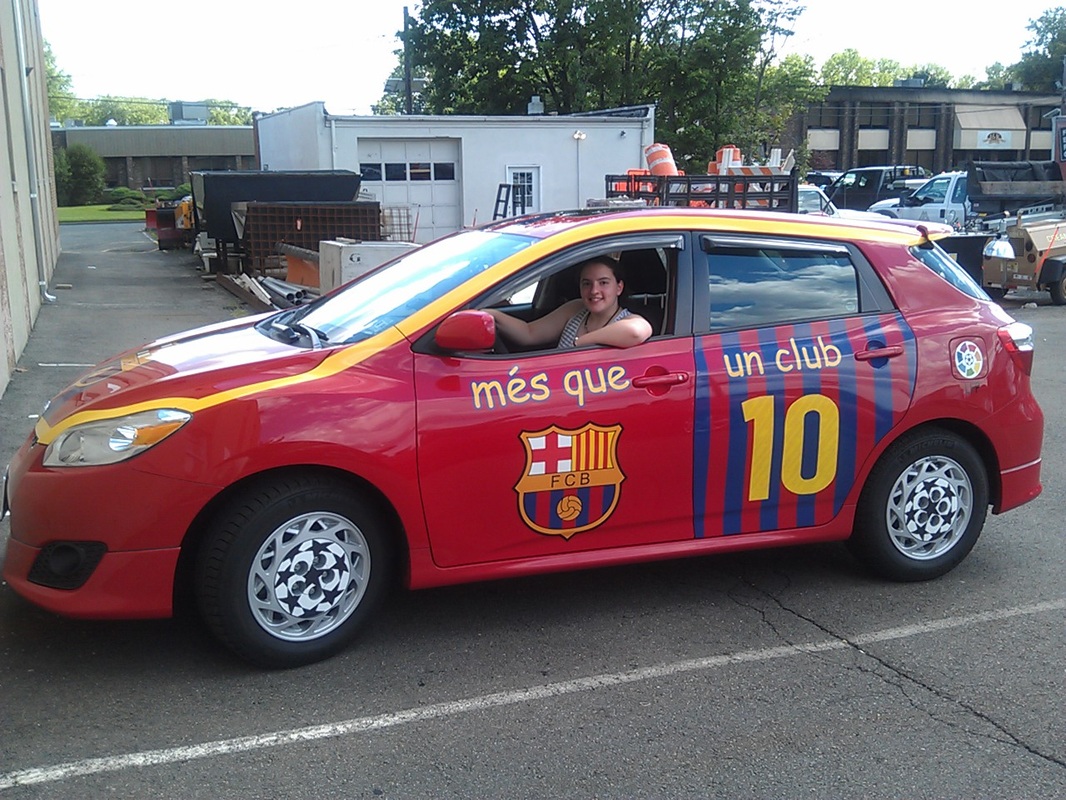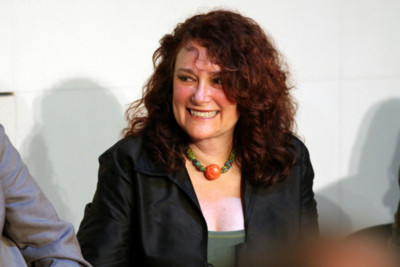|
Mario Balotelli broke down Germany – Germany! – on Thursday.
It was compelling viewing at the center-of-the-Italian universe, Mama’s of Corona, Queens, surrounded by antipasto and cannolis and friends. Three Italophiles – a local hero named Minaya plus a Blum and a Vecsey -- watched Balotelli grow in stature before our eyes. As soon as the big dude blasted his second goal against what had been the strongest-looking team in the Euros, his inner knucklehead could not resist, and he whipped off his jersey, the worldwide macho gesture of goal-scorer pride. Of course, by football regulations, that cost him a yellow card, making him vulnerable to suspension for Sunday’s final against Spain. Still, Balotelli was an impressive sight, a son of Ghanaian immigrants named Barwuah, adopted at 18 by an Italian family, displaying his rippling muscles. “If he scores another goal, they’ll put up a statue of him in Florence,” somebody said. “Il David Nero,” somebody added respectfully in Italian. The Black David. The growth of Balotelli in this tournament has been impressive, a tribute to the man himself and also to Coach Cesare Prandelli, who seems to treat him with calm dignity, neither despairing nor fawning. In the quarterfinals, Prandelli sent Balotelli out first for the penalty kicks against England, and the big guy whacked one past his Man City teammate Joe Hart. If the coach thought he belonged out there…. On Thursday we gathered for the semifinal at Leo’s Latticini, also known as Mama’s, at 46-02 104th St., about a mile south and west of the ballpark I prefer to call New Shea. Ron Blum is a football-soccer expert for the Associated Press; he takes his family to Verona and La Scala every year. I have been an Italy admirer since my first family trip decades ago. And Omar Minaya, son of the Dominican Republic, grew up in the traditionally Italian neighborhood of Corona, dropping into Mama’s when he could afford a sandwich or a biscotto. Later he played two seasons of pro baseball in Italy, and loves to speak the language. Minaya, who now lives in leafy New Jersey, and works in the front office of the San Diego Padres, was on a short home visit for his son's graduation. He remains the favorite son of Mama’s, which has two outlets in the Mets’ ballpark. When he worked nearby, he often ducked over to Mama’s for a snack, a chat, a World Cup match. Anybody who still has a home neighborhood is a lucky person. Although he left after the disastrous season of 2010, this is the kind of guy Omar Minaya is: last year he escorted his successor, Sandy Alderson, to Mama’s –“just to show him the neighborhood, you know,” Minaya explained on Thursday. Mama’s remains the way it has for seven decades, with inevitable changes. The matriarch, Nancy DeBenedettis, passed late in 2009 at the age of 90, but her name lives on. Get this: the official city street sign on the block now says: Mama’s Way. And get this: Public School 16, a few blocks away, has been officially renamed. The Nancy DeBenedettis School. (Read more here about her inspiring American life.) “I get tears in my eyes when I talk about it,” said Irene DeBenedettis, one of three sisters who operate the little empire on Mama’s Way. She was showing me a montage in the window, photos of friends and celebrities who have visited Mama’s. (Half a decade ago, Mario Batali, the celebrity chef, paid the huge compliment of dropping in. (“Mama asked him, ‘Who does your hair?’” Irene said, referring to his iconic ponytail. ) Inside, we were fussed over by Marie DeBenedettis and Carmela Lamorgese, Mama’s two other daughters, and we saw Carmela’s daughter, Marie DiFeo, and her baby, Gina DiFeo, born last Sept. 23, and was wearing an Italia shirt for the Germany match. The staff, from far-flung provinces of Italy, bustled in with cheese, salami, olives, bread, plus pasta with absolutely delicious broccoli rabé, followed by roast beef and potatoes and salad. There might have been a bit of wine, too. Then came the desserts and the coffee. Before the match, we stood and sang the Italian anthem, Il Canto degli Italiani (The Song of the Italians), the most merry anthem in the world. Perhaps we were not as passionate as Gigi Buffon, the Azzurri portiere, who bellows the anthem with his eyes closed, but we tried. Then we remained standing for the German anthem. Oranzo Lamorgese, Gina’s grandfather, is originally from Bari but lived and worked in Hamburg and Dusseldorf for a decade and played semi-pro soccer there. He spoke with great respect for modern Germany – and its football squad. At halftime, Marie DeBenedettis came back and said their deli next door just had a customer – Dwight Gooden himself, buying a hero sandwich. She had invited him to sit with us, but Doc said he was double-parked and didn’t want to get a ticket. We watched as Prandelli wisely removed Balotelli, to protect him from a second yellow card, to preserve him for the final as the Azzurri outlasted Germany, 2-1, to advance safely to the finals. Italy has long produced artful midfielders and defenders who specialize in the defensive catenaccio, the bolt. But now it has a force up front, a striker who is growing in size and tactics, match by match. The three sisters plied the Italophiles named Minaya, Blum and Vecsey with enough love and goodies to last us until Sunday’s final. Mille grazie, amiche mie. For the first time in over a decade, I watched a ball game from the stands. Now that I don’t spend my time in the press box, it seemed like something a semi-retired bloke should do,
I made a few discoveries, or re-discoveries: 1. It is expensive. My kid brother Chris and his wife CA were coming down from upstate and invited me to the Mets-Yankee game Sunday night at the stadium I prefer to call New Shea (what with my disdain for banks.) I never buy tickets for sports events because I work at them. I was horrified to learn that seats in Section 136 in left field cost $110 each. Oh, my goodness. I would have felt all right if Chris had spent, say, $45 per ticket. Later, I heard that the Mets were discounting thousands of tickets to fill up the park for the Dickey-Sabathia matchup. How do people manage to attend these events? (I did my best to combat high concessions prices by bringing in some delicious summer rolls and baguettes from my favorite little Vietnamese place in Bayside.) 2. It is noisy. The sound system bombarded us with witless noise from batting practice to the last out – denying fans a chance to talk baseball. 3. It is competitive. The Yankee fans were at least as loud as the Mets fans, reminding me of the 2000 World Series when Yankee fans gobbled up tickets on the open market and outcheered the Mets fans (Of course, they had more to cheer about in those three games in Shea.) 4. It can be funny. Four Yankee fans behind me (three of them female) were cheering for each Yankee home run. Two Mets fans (I think mother and daughter, in orange shirts) took offense. Do you have to be so noisy? The Mets mother asked, good-humoredly, maybe. We’re your guests, one Yankee woman retorted nicely, maybe. You should be more polite. They settled into a détente. After Cano’s homer put the Yankees ahead, one Yankee female offered a large box of fries to the Mets fan. I don’t want Yankee fries, the Mets mother sniffed. They have 27 more grams of sodium. Several rows of fans laughed. Nice one, the Yankee woman replied with a true New Yawkuh appreciation of a zinger. 5. The game is different from left field. My brother told me A-Rod had blasted shots far over our section in batting practice, but A-Rod came nowhere close when it counted. We were looking over the shoulders of Scott Hairston and Raul Ibanez, as they glided toward fly balls in their direction. Easy plays – for calm professionals, that is. Even from this far away, we could appreciate defense by Cano and Teixeira, and we could reconstruct a bad exchange near first between Turner and Dickey. But home plate was at the far end of our range. It was hard to see pitches cross home plate, hard to follow the umpire’s signal. 6. The ritual is reassuring. Directly in front of us, a boy in a yarmulke sat next to his dad, while capturing images of the game on his electronic tablet. We who have grown children may have felt a little nostalgic, even jealous, over watching this rite of passage. 7. Being in the crowd can be downright enjoyable. With rain pushing most fans back under the eaves, we huddled in place for the bottom of the ninth. We could hear the crack as Ike Davis lashed a drive to right for the final out. Mets and Yankees fans mingled soddenly, politely, on the down staircases. The three of us had survivors’ pride from getting through the sensory wars. I could see doing this again sometime -- if we start saving now. (Your comments on the inner life in the stands are appreciated.) There was a great tableau on television the other day when Cristiano Ronaldo asserted himself in the European soccer tournament.
A two-man jury of his peers – Eusebio and Luis Figo – was seen celebrating the goal that would put Portugal into the semifinals. My friend Rob Hughes described Ronaldo’s match so well in the International Herald Tribune and New York Times. Figo was leaping into the air as befits a Galactico of the past decade, whereas Eusebio was more earthbound as befitting a deity of the ‘60’s. They have given and suffered in public. Now it is Ronaldo’s turn. By sheer talent and burning will, Ronaldo has become the dominant player – perhaps the only dominant one – of the current Euros. You cannot take your eyes off him. Italy plays as a unit with masterful passing but no finishing. It controlled the ball for over 60 per cent of Sunday's scoreless quarterfinal with England and had to win it in a shootout. Germany, which beat plucky Greece on Friday, is a force, free and inventive enough, but depending on a system. Spain, going for an unprecedented third straight major championship, depends on brilliant players fitting into a balletic order. The short precise passes were beautiful to watch on Saturday during the 2-0 dismantling of France. The great correspondent Jere Longman writes that Spain is falling short of the high expectations it set. It's hard to tell from the tube, but that's why Jere is there, to get the feel on the ground: http://www.nytimes.com/2012/06/24/sports/soccer/euro-2012-critics-point-to-the-flaws-in-spains-art.html Italy and England, the two old men of the 2010 World Cup in South Africa, came into the Euros refitted with old parts and new parts. New parts contributed two of the most inventive goals of the tournament so far – Danny Welbeck’s backheel flick of a goal for England, Mario Balotelli’s powerful backward cannonball for Italy while out-wrestling an Irish defender. Welbeck and Balotelli are part of the changing face of European football, black men in a formerly mostly-white world. Both were in the starting lineups Sunday as their clubs figured out how much they needed them in the knockout quarterfinal match between England and Italy. . Balotelli, greeted by an unusual display of warmth from his Premiership colleagues in the pre-game handshake line, was a tower of frustrated strength, playing against his Manchester City teammtes, Joleon Lescott and Joe Hart, the keeper. He and Hart smiled at each other before Balotelli calmly scored on the first penalty kick. In a way, Eusebio is the spiritual grandfather of Welbeck and Balotelli.. Born in Mozambique of an Angolan father, he chose to play for Portugal. In the 1966 World Cup, he was the stately, sturdy core of the team that defeated Pele’s Brazil, 3-1, in the first round, with Eusebio scoring two goals. Pele and Eusebio on the same pitch. Can you imagine? In the quarterfinal round, Eusebio was hacked and pummeled by the mystery team from North Korea, caught so vividly in the greatest documentary ever made about soccer -- the classic Goal. Eusebio responded with four goals within a 32-minute span in mid-match, carrying Portugal to a 5-3 victory. Portugal lost to the host team England, 2-1, in the semifinals but 1966 was still the high point of Portugal’s international soccer history. A championship in the Euros would bring Ronaldo up to Eusebio’s stature. Figo was not so lucky. He was aging in the 2002 World Cup when Portugal surrendered three quick goals to the United States and lost its first match, 3-2, and never reached the knockout range. So now Figo leaps in the air in celebration of Ronaldo. Well, don’t we all. With his smirks and scowls and self-centered preening – and that is just toward his teammates – Ronaldo is not the most appealing figure in this tournament. Just the best, He can leap like a pro basketball player, making himself dominant in scrums at both ends of the field. He lurks like Maradona did, but can accelerate like a Bo Jackson or Gale Sayers going around the end in American football. Suddenly he is there. He stunned the very good young Czech defender, Theo Gebreselassie, son of an Ethiopian-born doctor and a Czech mother, by zooming in for the goal that won the quarterfinal and sent Figo flying and Eusebio beaming. We will see Ronaldo again in the semifinals against the defending champions. Then Italy against Germany. Lucky us. (Always happy to have your opinions/reactions/critiques under COMMENTS) (And just in case you missed these goals, the precious heart of this sport. We celebrate them when they happen.) http://www.youtube.com/watch?v=1rs4ahcHc-g http://www.youtube.com/watch?v=yYKs5VifNGU http://www.youtube.com/watch?v=HVgjeK_FFcA&feature=related Alkis Panagoulias, with his stout Greek-American heart, coached underdogs.
He was in charge of the Greek national team in the 1994 World Cup that did not score or even tie a match and he coached the American national team in 1985 that could not qualify for the World Cup. Now Alkis will miss the next big opportunity for glory as the surprising Greeks take on Germany Friday in the quarterfinals of the European soccer tournament. Panagoulias died Tuesday in his adopted home of Washington, D.C., at the age of 79. He was totally at home in both cultures, gloried in American progress in world soccer, reveled in the Greek championship in the 2004 Euros, shortly before they were host to the Olympics, where he worked at the soccer tournament. The Greek enclave of Astoria, in my home borough of Queens, will surely be buzzing Friday for the match that has obvious connections to the financial crisis of Europe. I’ve seen that neighborhood buzz before. In 1993 Alkis was sighted making a flying visit to a favorite taverna in Astoria, and people came flocking just to see him – Panagoulias is here! Panagoulias is here! -- and wish him luck. Greece would up losing all three matches against Nigeria, Bulgaria and Argentina, yielding 10 goals without scoring a single goal. His other World Cup fiasco came in 1985 when he was in charge of an American national team that played in the ruins of the North American Soccer League. Needing only a draw at home to advance to the final round of qualifying, the U.S. played Costa Rica in Torrance, Calif. Before game time, a band of several thousand Costa Ricans came marching into the stadium, honking horns and chanting. After the U.S. lost, 1-0, the heartbroken players retreated to the scungy little locker room. ''When are we ever going to play a home game?'' asked Gregg Thompson, a young defender from Minnesota. Alkis’ blunt response was: ''Never.'' Things have gotten better for both nations Panagoulias coached. At the moment, the Greeks are the personification of the question Butch Cassidy asked the Sundance Kid: “Who are these people?” With so many glamour teams in the Euros – current powers like Spain and Germany, teams with aura like Italy, France and England – Greece just keeps coming. It rallied for a 1-1 draw against Poland, lost to the Czech Republic, 2-1, and shocked Russia with a goal in the second minute of injury time in the first half and held on for a 1-0 victory. They play with passion and defense. Now they have been discovered. All of Europe is savoring the obvious implications of Greece playing Germany with the backdrop of the economic turmoil in the European Union. Make your own jokes. Going into the knockout round, Germany is the ascendant team in this tournament and Greece is the underdog. Alkis’ funeral is Friday at a Greek Orthodox church in Falls Church, Va., at 11 a.m. – leaving plenty of time for mourners to go root for his homeland. Have we had enough of trying to un-do the past? I am referring to the expensive and futile trials of Barry Bonds and Roger Clemens, whose cases are relevant to the ongoing pursuit of Lance Armstrong.
The charges against Bonds and Clemens ultimately failed because Major League Baseball allowed itself to be stonewalled by Donald Fehr and the Players Association long enough to avoid adequate rules and testing during the time of the steroids plague. By the same token, cycling was a swarm of corruption because every layer of that sport did not want to know – the Tour de France, the international federation, the sponsors, the media. Now the United States Anti-Doping Agency is going after Armstrong, who was beating riders who were ultimately caught cheating. Some of them are now giving testimony that Armstrong was the ringleader of cheating by his team. Some of the potential witnesses were loyal teammates of Armstrong. Their testimony could be important. But before going any further, USADA ought to look at the Clemens trial. The best thing Clemens had going for him was his accuser. McNamee was always a sleaze, even dressed up in a suit and tie for court or Congress, and he could never escape the aura of creepiness. The second best thing Clemens had going was the soft-minded indecisiveness of Andy Pettitte, his old buddy, who could not stay on message during his testimony. Pettitte probably received bad coaching from the same prosecutors who blew the first trial. They never had a chance the second time. The case should never have been re-tried. Nevertheless, we all pretty much know what Clemens is, a bully and a blowhard, and we have a pretty good idea that he cheated. Now he will be judged by time, and the public, and also by the baseball writers who vote for the Hall of Fame. The New York Times does not allow its writers to vote for awards in any field. If I did have a vote, I would not cast it for Clemens or Bonds because I have no doubt they juiced and lied about it. A whole generation – including Sosa, McGwire, Palmeiro and Canseco -- is going to be judged by this odd scruffy jury with long memories. Nobody likes being conned. One thing we have learned from these failed trials is that everybody needs to upgrade their laws and their senses to avoid the next round of plagues in every sport – doping, brain damage, gambling, sex abuse, corruption in American scholastic and college sports. Let’s fight the next battles. What’s your reaction? Several younger friends of mine have lost their fathers recently. What I tell them is, it never goes away. My father has been gone for over a quarter of a century and I still feel the impulse to pick up the phone.
Very often, it is about baseball. Every time Frank Francisco is teetering in the ninth inning, I feel like calling my father, who never heard of Frank Francisco, and blurting in morbid tones, “He’s going to give up a grand slam right now.” Of course, in this new age, my son sends me text messages like, “What are they doing?” My dad would have loved text messages. He was a newspaper guy, would have loved brevity, learned to edit copy on a computer in his late 60’s. I still can’t perform that intricate task and have great admiration for his picking up a new skill at that age. The other thing is politics. I grew up hearing my father emitting a growl about McCarthy or Nixon. I’d love to hear him whenever Mitt Romney says something oily. But the thing I miss the most about my father is his knowledge. He dropped out of high school at 15, but knew so much about books, movies, politics, sports and history. He taught me to love New York City – the ethnic enclave on the Brooklyn-Queens border where he lived as a kid, which other people (not him) pronounced Greenpernt. I have no interest in ever leaving New York because of the drives and subway rides we took when I was a little kid. A war bond rally at Ebbets Field around 1944. The Automats. News stands. He was always on my side, on all five of his kids’ sides. I realize that more all the time. Wish I could ask him about the Hungarian politician (whose name I am forgetting) who visited his neighborhood right after World War One, or the first game ever at Yankee Stadium in 1923. My dad played hooky, at 13 so he could attend. I never did slow down and ask him about that day. Wish I could call him. It never goes away. They pop up on the television, from different cities. Slava Bilic and Laurent Blanc could theoretically meet in the quarterfinals, although not the way they met in 1998 – with one of them reeling in faked mortal pain.
Bilic and Blanc are two of the most charismatic figures in the European soccer championships, even though they do their work on the sidelines. In their respective first games, the camera lingered on them, as if doing a favor for those of us who remember 1998. Coaching Croatia in the first match against Ireland, Bilic resembled a roguish literature professor, played by a younger Donald Sutherland, with a blue blazer and blue ski cap perched on his head, red tie askew. He looked like a teacher who gives his best seminars in a smoky pub. Blanc, who coaches France, was wearing a shirt and tie, his glasses making him look like a chemistry teacher, who doesn’t talk much in or out of the laboratory. But his bounce when the referee makes an unfavorable call gives him away as an athlete, inside the Clark Kent outfit. They have met before – in the semifinals of the World Cup in 1998, tangling in a scrum before a free kick. Blanc gave Bilic a mild push high on the chest and Bilic went sprawling backward, clutching his face, as if he had been hit by a tire iron. The referee sent Blanc off with a red card, the only one of his career, and he had to miss the final match after France held on to defeat Croatia. At the time, Bilic was generally vilified for his blatant faking. The replays were quite clear – a modest push, nowhere near the face, maybe worth a yellow card, but more likely just the normal close-order combat in the box. Bilic was mortified at costing Blanc a place in the final (France beat Brazil) but never backed off his assertion that he had been fouled, and reacted the way footballers react – with improvised death throes. To this day, Blanc says the contact was his fault, but he knows he did not deserve a red card. In this Euro tournament, the sons-of-Bilic continue their flopping. It’s hard to justify diving to Americans who are not soccer fans, but most of us who love the sport accept it as gamesmanship, working the ref to dig out his card, as an impulse. There is even the suspicion that some players practice their dives the way others practice their free kicks. To be a soccer fan, one has to be a combination drama critic and gymnastics judge. Bilic was guilty of bad acting. The ref deserved a red card for not checking with his associates on the sideline. The game goes on. Bilic is leaving his post after this tournament; he has given six years to coaching his homeland, as a patriotic gesture, he has said. Blanc is not even two years into his chore of trying to resurrect the fallen power of France. They are World Cup-level players, the best and brightest of their time. Croatia and France could both qualify for the quarterfinals on June 23 or 24. It would be fun to see them shake hands, this time with nobody staggering backward in feigned agony. (Your comments-replies-critiques are more than welcome right here. GV.) Over the weekend, I drove 14 hours around New Jersey and Pennsylvania and was reminded of the skill and courtesy of most long-distance truckers. Piloting 80,000 pounds of mobile weight at high speed, the vast majority of truckers are better than any other category of driver. I used to make long hauls in my car when we had places in Kentucky or Florida, and I learned to rely on truck drivers, particularly at night when traffic thinned out and we all could make time, legally, of course. This past weekend I was reintroduced to that reassuring sequence of giving the truckers plenty of room to pass me, or merge in front of me. I would flick my bright lights a couple of times and they would ease that behemoth in front of me, and when that bulk settled into place, they would tap their brakes once or twice, producing the ritual blink that says thank-you. . Many years ago, traffic was held up on Interstate 4 outside Orlando. When we got to the point of obstruction, a truck had jackknifed and turned over, strewing stuff all over the road. I doubt the driver survived. I made up my mind I would make sure all those trucks had room to ease carefully into the lane they needed. Sure, once in a while some cowboy with white-line fever barrels too fast, tailgating or changing lanes without signals. He needs to get off the road and into a rest stop. But most of them are really good – better than the yuppies trying to control a van with one hand while babbling into a cell phone, better than kids veering from lane to lane, better than seniors lumbering along in campers. For decades, I put in so many miles for work and family that I came to relate to truckers. Years ago I bought a cassette at a rest stop north of Richmond, Virginia – Best of Road Music, Volume II, great stuff from Bill Monroe, Hoyt Axton, Red Sovine, Jerry Jeff Walker. One very sweet song is Blue Highway, by John Conlee, about a trucker who reassures his wife that his night-life is non-existent as he roams America “in this whining time machine.” I want that trucker to get home safely. I want all of us to get home safely, when I am driving at midnight, and some trucker I will never meet gives me the tap-tap flicker of his brake lights. (Nice truck video below) Good Saturday. I'm finishing up a long day that began with the aroma of grilled meat and the rhythm of Latin music wafting through my open car window in the parking lot at the Meadowlands.
I hear the traffic is terrible outside. Good day for the real football -- soccer. I wrote a column in The Times. http://www.nytimes.com/2012/06/10/sports/soccer/argentina-vs-brazil-battle-of-stars-and-a-sign-of-soccers-arrival.html?_r=1&ref=sports And here is my take on the great rivalry itself, done for an interesting new outlet. http://whatahowler.tumblr.com/post/24698119812/vecsey-equalandopposite muito obrigado muchas gracias GV I’ve been looking forward to the tournament for weeks. I raved about the Euros on the Times Goal blog earlier this week (comments welcome there) and will undoubtedly write more for the Times’ soccer site, with all its resources.
In the meantime, I am putting up this entry as sort of an experiment, to keep it open for the next 24 days. I welcome my friends – anybody -- to comment on whatever happens. Or just watch the Euros and get outdoors as much as possible and do all the other good things at this time of year. I’m heading to the Meadowlands Saturday for Brazil-Argentina and will file for the Sunday paper. A few thoughts about the Euros: One thing I noticed in writing my Times essay was that surprising teams have won the Euros – Denmark in 1992, Greece in 2004. And other fans wrote about teams like Turkey that had their wonderful runs. Conversely, when you think about it, the Euros are a very tough tournament because they are the 16 survivors of European qualifying. There are few soft spots, as there can be in the World Cup, with its qualifiers from other regions. Sometimes the Euros can be a jumping-off point for a new dynasty, the way 2008 was for Spain. But given the hideous year-round schedule of soccer, dynasties do not last long. Remember how France won the World Cup in 1998 and then the Euros in 2000? I was sitting in Seoul in 2002 watching television as the French team got off the bus for a warmup – and those guys looked dead, and subsequently played that way. This sport chews you up. No nation has ever won the Euro championship twice in a row. Tough league. There are some great matchups in the first four days: Friday: Russia-Czech Republic. (Martina Navratilova beat a Soviet junior right after the clampdown of 1968 and she marched to the net and said in Russian: “You need a tank to beat me.”) Saturday: The Group of Death. Germany-Portugal right away. Good enough to be a semifinal. Sunday: Spain-Italy. I think I am going to be driving while that one is on. Unless... Monday: England-France. A tale of two anciens régimes. Love to hear your reactions from now through the finals. GV In 1989, a publisher sent me on a modest book tour, which included a day in San Francisco.
There I was taken around town by a media escort named Kathi Kamen Goldmark, one of the most charming people I have ever met. From then on, every time I pecked away on a book I did so with the ultimate goal of once again being driven around The City by this interesting lady who knew the parking spaces, the back doors, the on-air “talent” and where to hang out for coffee between appointments in the city by the bay. Over the years Goldmark organized the writers’ rock band, the Rock Bottom Remainders, and wrote her own book, and generally became more of a star than some wordy doofs like me she had escorted. It was a jolt to read her obituary in The Times on Sunday after she passed on May 24, of breast cancer. I will always have the vivid memory of chatting about books, Steely Dan, New York, the ‘60’s, and maybe even a bit of discreet gossip about other authors who had sat in my seat. Her passing reminds me of the episodic life journalists lead. Particularly at The Times, we have doors opened for us, we are taken inside, we meet people for an hour or two, and then we write our impressions – and we always remember that one encounter. Just off the top of my head I can think of some epic people I interviewed and essentially never met again – The Dalai Lama (just to drop a name), Colleen Dewhurst (on matinee day), Tony Blair (I knocked on No. 10 and just went in, pre-arranged, of course), Ronee Blakley (the lead in the Altman movie Nashville), Joyce Carol Oates (she had a boxing book going), Ruud Gullit (the great Dutch footballer, in a restaurant outside Genoa) and Rubin (Hurricane) Carter, the boxer who was doing time in New Jersey (“for something that he never done,” as Dylan put it; the guard offered me a seat on a spare electric chair in the waiting room, but I declined.) What I’ve learned is that these singular events do not come around again, although other singular events do. While pushing my Musial book in 2011 I had the distinct delight of being driven around one day by Elaine Bly, master St. Louis media escort, with her Tennessee accent and her BMW. Carpe diem. Enjoy the time. My condolences to Kathi’s family, friends, band mates, and all the one-day wonders like me, who had the pleasure of meeting her. Don’t go betting a single dollar based on this premonition, but I’ll Have Another is going to win the Belmont on June 9, for this reason:
I won’t be there. Despite the infractions and suspicions that follow Doug O’Neill, the trainer of I’ll Have Another, the horse is bound to do what 11 other horses could not do since 1973 – win the third straight leg of the Triple Crown. I’ll be writing for the Times that Saturday but from an earlier event – the great soccer rivalry of the Americas, Brazil against Argentina, at the Meadowlands. Closest I have come to the Triple Crown was listening to the car radio in 1973 while we were heading home from a picnic. Nearly 16 years later, I got to pet Secretariat at the farm; you could feel the ground shake when he ambled over for the cube of sugar. A few months later, the great red beast was put down. Four times I was at the Belmont when the winner of the Kentucky Derby and the Preakness came up short. The expectation has built up over the years, that some great equine hope would put life back into a fading sport, but each time the air goes out of the big barn on Long Island. I was there in person for Alysheba in 1987 and Sunday Silence in 1989 and Silver Charm in 1997 and Charismatic in 1999. The worst time was when I got totally caught up in Charismatic, chestnut great-grandson of Secretariat, as he blasted through the first two races. I even drove down to JFK airport just to catch a glimpse of Charismatic ambling off the transport plane. Late that Saturday afternoon Charismatic blew out a leg on the home stretch, and Chris Antley, the jockey, leaped down to stabilize his mount before he did fatal damage. (see the video above.) The wait for the Triple Crown went on. I was in the Alps in 2003, laughing as Lance Armstrong said he rooted for gallant little Funny Cide, who fell short in the Belmont. A year later I was back on Long Island as Smarty Jones’ stable shimmered with high expectations. For a lovely tableau of the giddiness and color surrounding a Triple Crown hopeful, read the dispatch filed that day by the sports columnist of the Baltimore Sun at that time, local girl named Laura Vecsey: http://articles.baltimoresun.com/2004-06-05/sports/0406050154_1_smarty-jones-seattle-slew-colt We stood outside the barn and watched as the gracious trainer John Servis welcomed a small group of nuns from the Little Sisters of the Poor. I remember my colleague nudging me as we both had the same fear: Jinx! The next day, Birdstone won the Belmont. Watching Charismatic fall apart discouraged me from ever committing that way again. I take very seriously the concerns voiced by Bill Rhoden that this dangerous and perhaps callous sport may not deserve the glory of a Triple Crown, but I cannot help it. I still want to see a Triple Crown. However, I may have to settle for hearing it on the car radio, the way I did for Secretariat. Just remember this: I never bet on racing; don’t do anything rash based on my whimsy. Your comments are always welcome. |
Categories
All
|
